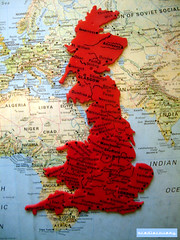The two meanings of ‘British’
Nationalists and Unionists have been having a curious little spat for the last couple of days. I think it started with Ed Miliband claiming that Scots will no longer be British if their country votes to leave the United Kingdom. Nationalists were quick to reply that given that Scotland is geographically a part of Great Britain, Scots will always be British, no matter which state they’re living in.
I do believe it’s a bit of a silly fight to get into.
It’s a matter of fact that the word British has at least two meanings in modern English:
- relating to, denoting, or characteristic of Great Britain [where Great Britain can then mean either just the island or include also the small adjacent islands such as Skye and the Isle of Wight] — parallel to the modern use of Scandinavian
- relating to, denoting, or characteristic of the United Kingdom — parallel to the occasional use of Scandinavian to refer to people from the short-lived Kingdom of Sweden and Norway
The second meaning is probably more frequent than the first for the simple reason that there isn’t any other convenient adjective describing somebody from the United Kingdom of Great Britain and Northern Ireland, and it’s obviously this meaning that Ed Miliband was referring to. However, the first meaning seems more primary, and of course you can’t tell people in Scotland that they suddenly aren’t allowed to use this sense of the word.
I guess it’s related to the question of what the rUK will be called after Scottish Independence:
- The United Kingdom of Great Britain and Northern Ireland? It’s really not a good name when one half of Great Britain has just left.
- The United Kingdom of England and Northern Ireland? Although Wales was part of England prior to the formation of the Kingdom of Great Britain, I doubt they’d accept this.
- The United Kingdom of England, Wales and Northern Ireland? I’d say this is the most likely result.
However, which adjective will people use to refer to somebody or something from The United Kingdom of England, Wales and Northern Ireland? Although it will annoy the Northern Irish and the Scots in equal measure, I have a feeling many English people will continue to use British. I mean, what’s the alternative? Engwalnish?

I think they’d have to use the United Kingdom of Britain and Northern Ireland, since the “great” part, as in “greater”, refers to the union of North Britain (Scotland) and South Britain (England & Wales).
It’s interesting that “NB” as a postal address for Scotland survived into the 19th century, yet South Britain appears to have fallen out of use in the 17th.
Really? My understanding was that ‘Great’ what there to differentiate Great Britain from Small Britain = Brittany.
But if you’re right, surely a more appropriate name would then be the United Kingdom of South Britain and Northern Ireland…?
The term united kingdom is found in informal use during the 18th century to describe the new state but only became official with the union with Ireland in 1801.